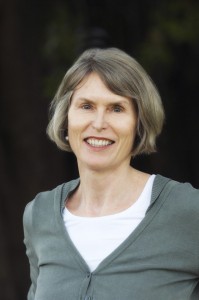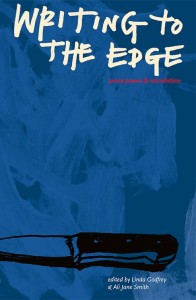 1. What inspired you to write the prose poem/microfiction which will appear in Writing To The Edge?
1. What inspired you to write the prose poem/microfiction which will appear in Writing To The Edge?
Both prose poems that will appear in WTTE reflect some frustration I feel about current political and environmental situations. But they started with the small detail–in one poem, from a bit of internet browsing (often a source of wonder and delight–the cucumber discussion board, anyone?) and in the other, observations from waiting in a queue at K-Mart. In each case, a small absurdity stuck in my head and wove itself into a much larger story.
2. Tell us about your process. (Do you start sparse and widen out, or do you write down every possible association and cut back? Do you research the subject matter you are writing about? Is it pure intuition?) Take us through an example if you want.
I usually start with a few words or a line or image that resonates in my subconscious and demands to be explored. I like to develop the sounds and rhythms in my head and play round with them out loud until I have the beginnings of a poem. Sometimes I’ll make notes at this point and come back to them later (in the case of ‘happy’, several months later). Otherwise, I start writing once the poem gets too long to remember (as with ‘trolley jam’) or I want to see a visual form. Then I expand the basic draft, move lines round and add in more detail, sharpen images, and generally work towards meaning in a structured way. With both these prose poems, once I had a clear sense of where I was going, I did quite a lot of background reading while weaving in the political threads and that in turn gave me more material. Once I have a working draft it’s time for feedback and fine-tuning.
3. What advice do you have for other writers? (About the first or last line? About how to choose the title? Do you follow any rules?)
I love Paul Klee’s advice about drawing–‘take the line for a walk’. I think that’s the best advice I know for writing as well. Get out of your own way and just write, or perhaps that should be, let your subconscious write. The surrealists used to draw with the ‘wrong’ hand in order to subvert their rational minds–makes sense to me. When I started writing prose poems, I found it hard to make sense of the genre as the definitions seemed to be as amorphous as the form. Now I love that. No rules…I just write stuff down.
I work in a prose group as well as a poetry group. Both meet on a regular basis. Listening to my work being read out loud by someone else often helps pinpoint where more work needs to be done. Giving and receiving feedback with other writers has been invaluable in teaching me about writing, as has coursework and one on one discussion with other writers. I love the comment I once received about a last line–‘it needs another syllable’.
4. Who or what inspires your writing?
Workshopping, reading, talking with other writers, listening to other poets read their work. Also standing in queues, random internet sites, overheard conversations–lately, a bus ride to the city and a wait at Medicare proved inspirational. I’m a complete bowerbird. But mainly, I think, I need solitude to find that internal inspiration. I like to spend time pottering in my garden, I go for walks, do yoga and a bit of meditation. If I’m too busy my writing is crap.
5. Tell us what you do if you haven’t written anything in a while and you want to get started writing again? Could you share your favourite writing exercise with our readers?
I’m not writing much poetry at the moment as my focus is on finishing my novel and I’m a slow writer in any case. But bumping up against the world often inspires (see queues above). An exercise I enjoy is free-writing around two or three clues picked at random from different cryptic crosswords–even if this doesn’t produce something usable, it loosens the strings of my mind.
Writing groups have been an important part of my writing life, providing structure and feedback in what is essentially a solitary process. And those group deadlines mean I have to keep writing.Most of all, writing generates writing. I like to sit down with a cup of tea and write as soon as I get up. Then a walk to clear my head and some more writing or editing before I do any of my other work. That’s my ideal scenario anyway.
 Hilary Hewitt lives and works in Sydney’s inner west. She was shortlisted in the 2012 Overland Victoria University Overland Short Story Prize for New and Emerging Writers and the Margaret River Short Story Competition 2013.
Hilary Hewitt lives and works in Sydney’s inner west. She was shortlisted in the 2012 Overland Victoria University Overland Short Story Prize for New and Emerging Writers and the Margaret River Short Story Competition 2013.
